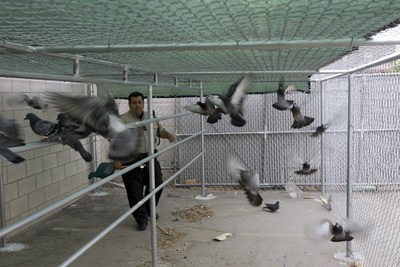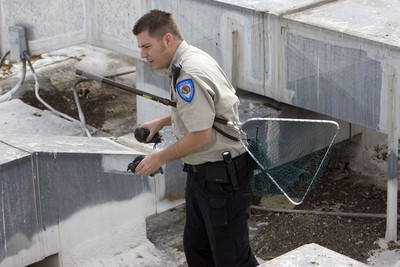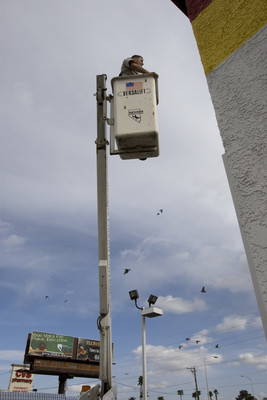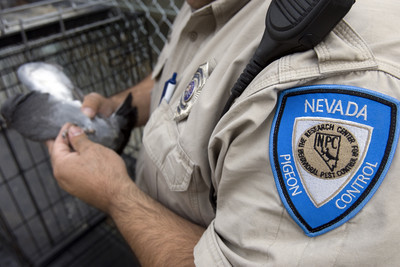Company tries to control pesky pigeons
There is a cage of chain-link, filled with birds. The cage is tall enough for a man to stand in, wide enough to stretch your arms out, long enough for a short sprint from end to end.
There is a man who removes what eggs may come, so the birds do not multiply. He replaces them with fakes, so the birds remain calm.
There is birdseed in the cage, of course, a pole for perching, the flapping of wings and a gentle coo-cooing that sounds peaceful as it echoes.
There is also much bird poop, as anyone would expect there to be in a pigeon sanctuary.
A pigeon sanctuary, yes. A place where pigeons are expected to live their lives in peace. The facility, in an industrial area near Cheyenne Avenue and Commerce Street, is no fancy rat hotel, but it does not seem a bad existence.
It is also a new way of dealing with a hated vermin; pigeons are usually killed or released, which means they'll come back.
Their poop -- a mere 80 birds can produce a ton of the stuff every year -- is acidic, which can ruin paint and roofs and air-conditioning units. They spread disease and filth.
The sanctuary, as it is, was the brainchild of Nephi Oliva, a local musician and songwriter who one day got tired of all the coo-cooing outside his window.
He investigated. He tried everything he could think of to humanely get rid of them, but nothing worked. He began to believe the entire pest control industry was perpetrating a scam when it came to pigeon control.
He spent the next five years thinking, experimenting, watching pigeons.
He knew he did not want to hurt the birds -- "I don't want to be the Hitler of pigeons," he said -- which led to a light-bulb moment.
A sanctuary.
He embraced the idea so wholeheartedly, he started a business. Now, his company aims to get rid of pigeons with minimal death. He hopes for a pigeon-free Las Vegas.
Fees for the service vary, depending on the size of the property and other factors. He won't do individual houses unless the whole neighborhood association gets involved. Doing one house only moves the problem; it does not solve it.
He does not solve the problem, by the way, with spikes or screens, as seems to be the industry standard. No glue or poisons or fake owls. These, he swears, do not work.
What Oliva does is capture the pigeons, mostly. Traps, nets, cages. An air rifle for the few stragglers who are too smart -- or scared -- for capture. It is an inevitable downside, he said.
The captured pigeons go into the cage, the company cleans up the often considerable mess, and workers go back every few weeks to be sure no new pigeons have re-established a base of operations.
The process seems to be working. Oliva's company, Nevada Pigeon Control, which he started a few years ago, claims a clientele that includes major casinos, homeowners associations and large apartment complexes all over town.
"They were crapping all over the ground, the street, cars, stuff like that," said Willie McCord, operations manager for Clear Channel Outdoor, the billboard company.
He said they'd tried all the traditional methods to keep the pigeons off their billboard, and they'd work for a little while. Then the pigeons would return.
No more.
"We've seen a huge reduction in pigeons on our structures, which has helped with a lot of our health district issues, citations and stuff like that," he said.
Lee Lawrence, the pest-control license and enforcement program manager with the state Department of Agriculture, said he applauds new tactics in pigeon eradication.
"We want to encourage as many people out there to control pigeons as we can," he said.
He said a pigeon control company that does not use poisons is not required to have a state pest-control license. There is no danger to the public, he said.
He said the key to getting rid of pigeons is not just getting rid of pigeons. It's making sure they don't come back.
"It's difficult," he said. "How do you find a permanent solution when these critters keep reproducing?"
But a sanctuary? Isn't that, well, a little goofy?
Maybe it is, he said, maybe it isn't. But it could work, provided there's enough space.
Oliva acknowledged that his cage isn't big enough. He just started using it a few weeks ago. It'll fill up soon. He knows that.
He has grand plans for more, much more. He estimated that there are about 500,000 pigeons in the Las Vegas Valley right now. In a few years, there could be 1.5 million.
He wants to capture them all.
But they won't fit in a tiny cage, built to hold maybe 2,000 birds but so far holding far less than that.
So Oliva wants acres and acres dedicated to pigeons. He's still working on the details.
He's got other plans, too. He wants to work for the local municipalities, much like a public utility. Cities would contract with his company, then charge residents a small fee. There would be pigeon traps that Oliva has designed on light poles all over town, which he and his crew would check on every day.
Pigeon control would become as normal a part of our lives as trash pickup, the meter reader and water cops.
His company would expand from about a half-dozen employees to more than 200 in the next couple of years.
And the pigeons? Peacefully coo-cooing, eating free seed, mating and pooping out the rest of their lives away from the rest of us.
Contact reporter Richard Lake at rlake @reviewjournal.com or 702-383-0307
Slideshow, video






















